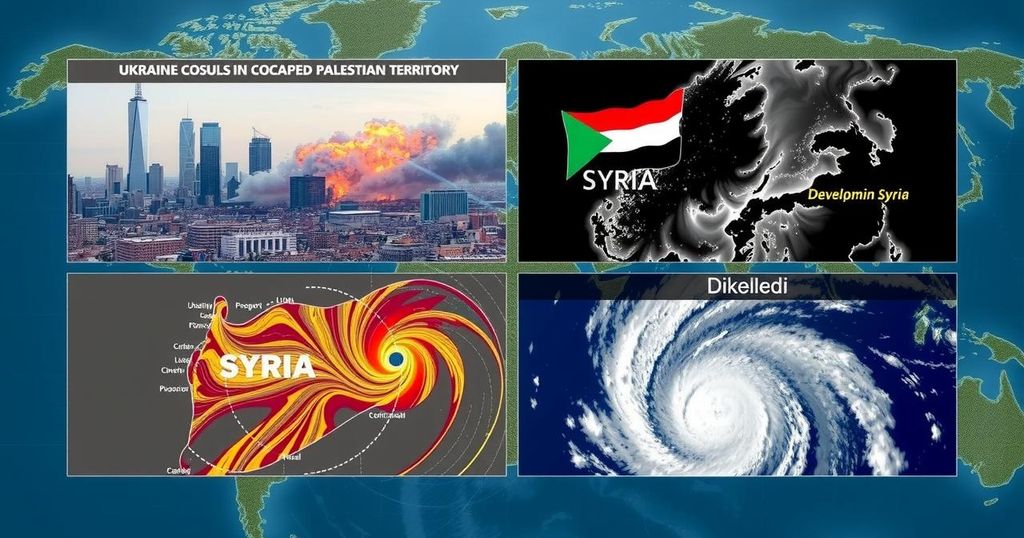This article highlights the urgent humanitarian crises in Ukraine, Gaza, Syria, and the aftermath of Tropical Cyclone Dikeledi. Key points include UN efforts to support affected populations, the challenges faced in delivering aid, and the ongoing needs for essential resources in these regions.
Recent activities by UN officials highlight the ongoing humanitarian crises in Ukraine, the Occupied Palestinian Territory, Syria, and the impact of Tropical Cyclone Dikeledi in Southeast Africa. Under-Secretary-General for Humanitarian Affairs Tom Fletcher is engaged in Ukraine, witnessing firsthand the destruction and the need for humanitarian assistance. In Gaza, the UN Office for the Coordination of Humanitarian Affairs (OCHA) is demanding that Israel allows the delivery of essential aid amid worsening conditions. Meanwhile, in Syria and the aftermath of Cyclone Dikeledi, efforts continue to address critical humanitarian needs across these impacted regions.
In Ukraine, Under-Secretary-General Tom Fletcher is actively visiting areas affected by the ongoing conflict. This week, he held discussions with local authorities in Zaporizhzhia and visited impacted sites, including a missile-struck medical clinic. His travels have included meeting displaced individuals in Dnipro and commending local first responders for their work. Tomorrow, he will continue his assessment in Kharkiv and prepare for the launch of humanitarian plans alongside Filippo Grandi of the UN Refugee Agency.
The humanitarian crisis in Gaza continues to escalate as OCHA reports significant obstacles to aid delivery, with only a fraction of planned humanitarian efforts facilitated by Israeli authorities. Recent evacuation orders threaten to displace more civilians, aggravating the existing shortages of food, water, and sanitation. Humanitarian Coordinator Muhannad Hadi stressed the critical need for the protection of civilians and their shelters amidst ongoing hostilities, as most children in Gaza remain without schooling over 15 months into the conflict.
In Syria, OCHA reports persistent challenges in providing humanitarian support due to ongoing violence that disrupts logistics. Recent vaccination campaigns against cholera in Al Hol camp exhibited some progress, but significant security concerns in regions like Aleppo hinder access to aid for many communities facing serious water shortages.
Additionally, Tropical Cyclone Dikeledi has impacted northern Madagascar, with the UN mobilizing support for those affected by the cyclone. In Mozambique, communities are still recovering from Cyclone Chido, with the UN providing food rations and relief items to displaced individuals. The humanitarian community aims to assist over 400,000 people affected, underscoring the urgent need for more funding to address these crises adequately.
The humanitarian landscape is increasingly complex, with multiple concurrent crises requiring urgent attention from international organizations. In Ukraine, the ongoing conflict has led to widespread displacement and destruction, prompting humanitarian agencies to enhance collaboration with local authorities. In the Occupied Palestinian Territory, the situation in Gaza continues to deteriorate, with significant access restrictions impacting aid efforts. Syria faces enduring strife, greatly complicating the provision of basic services. Meanwhile, Tropical Cyclone Dikeledi has exacerbated vulnerabilities in Southeast Africa, creating additional challenges for humanitarian responses in the region.
The interviews and visits conducted by UN officials underscore the pressing need for international support in several crisis-affected regions. In Ukraine, logistical and operational partnerships are essential for managing the impact of conflict. The situation in Gaza and Syria requires urgent humanitarian access and protection of civilians, while the repercussions of Cyclone Dikeledi in Southeast Africa highlight the need for comprehensive disaster relief responses. Overall, the interlinked nature of these crises necessitates coordinated global efforts to alleviate suffering and restore basic living conditions.
Original Source: www.unocha.org






